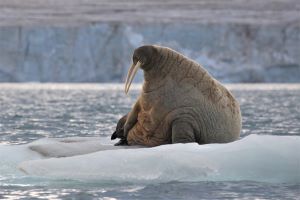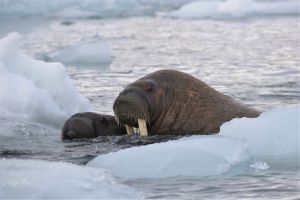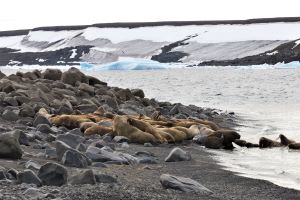Rosneft Summarises Results of Arctic Walrus Population Field Surveys

24 November is Walrus Day, the aim of which is ‑to raise public awareness of the need to protect these marine mammals and preserve the numbers of the largest pinnipeds in the northern hemisphere. The Atlantic walrus is one of the most endangered animals in the Arctic, ‑listed in the Russian Red List and the International Red List.
Reaffirming its commitment to achieving sustainable development goals, Rosneft pays special attention to the preservation of a favourable environment and biodiversity, and works continuously to minimise its environmental impact. The Company is implementing a programme to study key indicator species for the sustainability of ecosystems in the Arctic region: polar bear, wild reindeer, Atlantic walrus and Ivory gull. The Company considers the conservation of these species and their habitats to be one of its environmental missions.
 Rosneft has been conducting studies on the numbers and population characteristics of the Atlantic walrus subspecies since 2015. The Company’s expeditions cover the waters and coast of Russia from the Barents Sea to the Chukchi Sea. During the 2022 field season, Rosneft, together with the A.N. Severtsov Institute of Ecology and Evolution Problems of the Russian Academy of Sciences and the Lomonosov Moscow State University Marine Research Centre continued expeditionary research on walruses.
Rosneft has been conducting studies on the numbers and population characteristics of the Atlantic walrus subspecies since 2015. The Company’s expeditions cover the waters and coast of Russia from the Barents Sea to the Chukchi Sea. During the 2022 field season, Rosneft, together with the A.N. Severtsov Institute of Ecology and Evolution Problems of the Russian Academy of Sciences and the Lomonosov Moscow State University Marine Research Centre continued expeditionary research on walruses.
With Rosneft’s help, the Franz Josef Land archipelago, the Orange Islands (territory of the Russian Arctic National Park) and Victoria Island were studied for the first time. A detailed mapping of known walrus haulouts was carried out, and new pinniped haulouts were discovered and described. In 2022, the largest haulout – more than 650 male, female and baby walruses – was found on Heiss Island. The animals were counted using UAVs, and more than 1,200 animals were registered. Scientists also tagged 26 pinnipeds with satellite transmitters.
 Полученные Компанией данные о численности популяции атлантического моржа значительно превышают прежние – более 7,3 тыс. особей. The largest aggregation, of over 2,000 animals, was recorded in 2021 on Eva-Liv Island (Franz Josef Land). In total, more than 40 islands were surveyed during the 2021 and 2022 field seasons. The results will contribute to the conservation of this rare species, improve monitoring techniques and fill gaps in scientific knowledge of walruses.
Полученные Компанией данные о численности популяции атлантического моржа значительно превышают прежние – более 7,3 тыс. особей. The largest aggregation, of over 2,000 animals, was recorded in 2021 on Eva-Liv Island (Franz Josef Land). In total, more than 40 islands were surveyed during the 2021 and 2022 field seasons. The results will contribute to the conservation of this rare species, improve monitoring techniques and fill gaps in scientific knowledge of walruses.
Справка:
Walruses are among the largest members of the Arctic fauna, in size second only to elephant seals.
Some trivia:
- The Greek name for the walrus is «Odobenus rosmarus», which literally means «walking on teeth». Walruses get their name from their ability to cling to ice and climb on ice with their tusks.
- Walruses slow their heart rate to withstand the low temperatures of the northern waters;
- Walruses can turn light grey or even pink. Walruses are usually brown in colour, but when immersed in cold water they turn light grey, or pink when exposed to the sun. This is due to their ability to alter the blood supply to their body’s periphery under certain circumstances.
- Walruses can hold their breath underwater for up to 30 minutes;
- Their diet is based on bottom-dwelling bivalve molluscs, as well as gastropod molluscs, polychaetes and bristleworms. Walruses have practically no teeth, so they «chew up» or grind their prey with their jaws.
- A walrus pregnancy lasts for a year, and the baby feeds on its mother’s milk for another year after birth.
Rosneft
Information Division
November 24, 2022